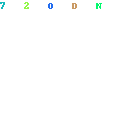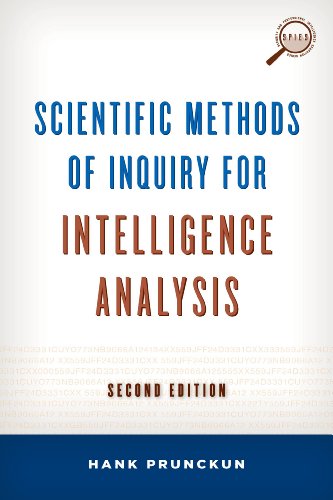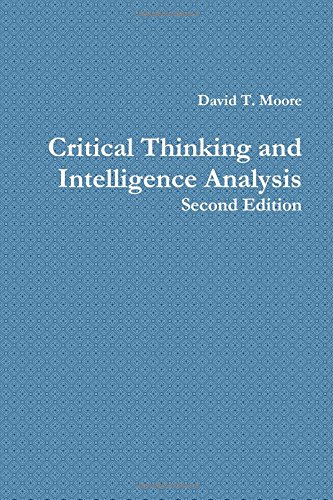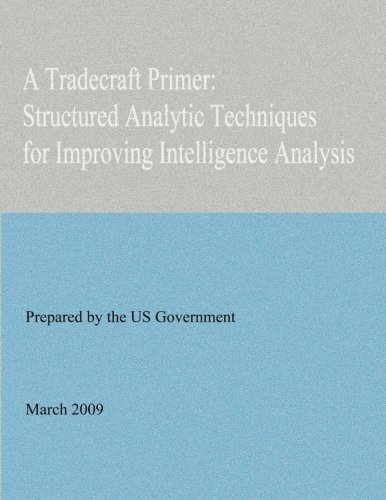We spent many hours on research to finding intelligence analysis, reading product features, product specifications for this guide. For those of you who wish to the best intelligence analysis, you should not miss this article. intelligence analysis coming in a variety of types but also different price range. The following is the top 15 intelligence analysis by our suggestions:
Reviews
1. Scientific Methods of Inquiry for Intelligence Analysis (Security and Professional Intelligence Education Series)
Feature
Rowman Littlefield PublishersDescription
Since 9/11, the needs of intelligence agencies as well as the missions they conduct have increased in number, size, and complexity. As such, government and private security agencies are recruiting staff to analyze the vast amount of data collected in these missions. This textbook offers a way of gaining the analytic skills essential to undertake intelligence work. It acquaints students and analysts with how intelligence fits into the larger research framework. It covers not only the essentials of applied research, but also the function, structure, and operational methods specifically involved in intelligence work. It looks at how analysts work with classified information in a security conscious environment as well as obtain data via covert methods. Students are left with little doubt about what intelligence is and how it is developed using scientific methods of inquiry.This revised edition of the popular text has been expanded and updated significantly.
2. Open Source Intelligence Techniques: Resources for Searching and Analyzing Online Information
Description
Completely Rewritten Sixth Edition Sheds New Light on Open Source Intelligence Collection and AnalysisAuthor Michael Bazzell has been well known in government circles for his ability to locate personal information about any target through Open Source Intelligence (OSINT). In this book, he shares his methods in great detail. Each step of his process is explained throughout twenty-five chapters of specialized websites, software solutions, and creative search techniques. Over 250 resources are identified with narrative tutorials and screen captures. This book will serve as a reference guide for anyone that is responsible for the collection of online content. It is written in a hands-on style that encourages the reader to execute the tutorials as they go. The search techniques offered will inspire analysts to "think outside the box" when scouring the internet for personal information. Much of the content of this book has never been discussed in any publication. Always thinking like a hacker, the author has identified new ways to use various technologies for an unintended purpose. This book will greatly improve anyone's online investigative skills. Among other techniques, you will learn how to locate:
Hidden Social Network Content
Cell Phone Subscriber Information
Deleted Websites & Posts
Missing Facebook Profile Data
Full Twitter Account Data
Alias Social Network Profiles
Free Investigative Software
Useful Browser Extensions
Alternative Search Engine Results
Website Owner Information
Photo GPS & Metadata Live
Streaming Social Content
Social Content by Location
IP Addresses of Users
Additional User Accounts
Sensitive Documents & Photos
Private Email Addresses
Duplicate Video Posts
Mobile App Network Data
Unlisted Addresses & #s
Public Government Records
Document Metadata
Rental Vehicle Contracts
Online Criminal Activity
Personal Radio Communications
Compromised Email Information
Automated Collection Solutions
Linux Investigative Programs
Dark Web Content (Tor)
Restricted YouTube Content
Hidden Website Details
Vehicle Registration Details
3. Intelligence Analysis: How to Think in Complex Environments (An Ausa Book)
Description
This book offers a vast conceptual and theoretical exploration of the ways intelligence analysis must change in order to succeed against today's most dangerous combatants and most complex irregular theatres of conflict.
4. Open Source Intelligence Techniques: Resources for Searching and Analyzing Online Information
Feature
Open Source Intelligence Techniques Resources for Searching and Analyzing Online InformationDescription
Fifth Edition Sheds New Light on Open Source Intelligence Collection and Analysis.Author Michael Bazzell has been well known and respected in government circles for his ability to locate personal information about any target through Open Source Intelligence (OSINT). In this book, he shares his methods in great detail. Each step of his process is explained throughout sixteen chapters of specialized websites, application programming interfaces, and software solutions. Based on his live and online video training at IntelTechniques.com, over 250 resources are identified with narrative tutorials and screen captures.This book will serve as a reference guide for anyone that is responsible for the collection of online content. It is written in a hands-on style that encourages the reader to execute the tutorials as they go. The search techniques offered will inspire analysts to "think outside the box" when scouring the internet for personal information.
5. Structured Analytic Techniques for Intelligence Analysis
Feature
Used Book in Good ConditionDescription
This book takes the relatively new concept of structured analytic techniques, defines its place in a taxonomy of analytic methods, and moves it a giant leap forward. It describes 50 techniques that are divided into eight categories. There are techniques for:
- Decomposition and Visualization
- Idea Generation
- Scenarios and Indicators
- Hypothesis Generation and Testing
- Cause and Effect
- Challenge Analysis
- Conflict Management
- Decision Support
Each structured technique involves a step-by-step process that externalizes an individual analyst s thinking in a manner that makes it readily apparent to others, thereby enabling it to be shared, built on, and easily critiqued by others. This structured and transparent process combined with the intuitive input of subject matter experts is expected to reduce the risk of analytic error.
Our current high tech, global environment increasingly requires collaboration between analysts with different areas of expertise and analysts representing different organizational perspectives. Structured analytic techniques are the ideal process for guiding the interaction of analysts within a small team or group. Each step in a technique prompts relevant discussion within the team, and such discussion generates and evaluates substantially more divergent information and more new ideas than a team that does not use a structured process.
By defining the domain of structured analytic techniques, providing a manual for using and teaching these techniques, and outlining procedures for evaluating and validating these techniques, this book lays a common ground for continuing improvement of how analysis is done. These techniques are especially needed in the field of intelligence analysis where analysts typically deal with incomplete, ambiguous and sometimes deceptive information. However, these practical tools for analysis are also useful in a wide variety of professions including law enforcement, medicine, finance, and business.
6. Intelligence Analysis; A Target-Centric Approach Fifth Edition
Feature
Intelligence Analysis A Target Centric ApproachDescription
The book includes material on the intelligence cycle, collection, managing analysis and dealing with intelligence customers. Combining a practical approach to modelling with his insider perspective, Clark creates an ideal resource for students and practitioners alike.7. Structured Analytic Techniques for Intelligence Analysis;
Feature
Structured Analytic Techniques for Intelligence AnalysisDescription
This second edition continues to showcase current and cutting-edge best practices but has broadened its focus beyond intelligence to show how SATs can be used across different disciplines and professions, from business and law enforcement to homeland security8. Intelligence Analysis: A Target-Centric Approach, 2nd Edition
Feature
Used Book in Good ConditionDescription
For nearly 50 years, facing a static enemy, American intelligence analysis was based on a hierarchical decision-making process that oftentimes insulated analysts from criticism and interaction with the ultimate consumers of their product. In countering asymmetric threats and non-state adversaries, the model is simply outmoded. A flatter, horizontal, networked solution has proven much more effective in today's world.In his second edition, Robert Clark--former CIA analyst and executive in the Intelligence Directorate--explains how a collaborative, target-centric process both attends to the needs of the customer and promotes more effective collection. Based on feedback from users, early chapters introduce the concept of model synthesis more gradually. Recent intelligence events--with the Iraqi WMD Commission Report at center stage--illustrate the importance of target-centric analysis. This revision also includes broader treatment of collection strategies, systems analysis, and analyst-customer interaction as well as more attention to denial and deception, and to both counterterrorism and counterintelligence analysis.
This new edition contains updates of the practical information and day-to-day details from the previous book told as only an experienced intelligence hand could. Extensive descriptions of the art of target modeling and organizational analysis, as well as thoroughly detailed overviews of the quantitative and predictive techniques used in intelligence analysis make this book an essential tool for illuminating an often shadowy world.
9. Critical Thinking and Intelligence Analysis
Description
This National Defense Intelligence College publication defines critical thinking in the context of intelligence analysis, explains how it influences the entire intelligence process, explores how it toughens the art of intelligence analysis, suggests how it may be taught, and deduces how analysts can be persuaded to adopt this habit. "David Moore has added his powerful voice to those calling for America's intelligence analysts to be more self-conscious about their methods and more venturesome in applying more formal methods." - Gregory F. Treverton, Rand Corp. ". . .a valuable initiative on behalf of the Intelligence Community" - Francis J. Hughes, National Defense Intelligence College.10. An Introduction to Intelligence Research and Analysis (Security and Professional Intelligence Education Series)
Feature
Used Book in Good ConditionDescription
Since the September 11, 2001 terrorist attacks on United States soil, the intelligence community has been scrutinized on how it performs its functions. Consequently, the 9/11 Commission made several recommendations on how to improve the quality of intelligence analysis. Those charges and the United States' involvement in a war in Iraq have spawned additional charges of the politicization of intelligence. All this is being played out as the Intelligence Community has reformed and reconfigured itself with newly created departments supported by an expanded and inexperienced workforce that was never envisioned when the intelligence community was formally established in 1947.First published in the 1970s, the classic book An Introduction to Intelligence Research and Analysis was used by intelligence analysts to track and monitor the Communist threat. Although today's environment has changed considerably since the Cold War, intelligence analysts still need to understand the basics of intelligence analysis. The book focuses on how to do research, what qualities are needed to be an intelligence analyst, and what methods can be employed to help in producing products. To avoid politicization, intelligence analysts should strive to become more transparent in their methodology of how they arrived at their conclusions. Intelligence Research and Analysis provides several methods to assist in that end.
11. Psychology of Intelligence Analysis
Feature
Ships from VermontDescription
First commissioned by the CIA, this book offers a fascinating look at the never-ending quest for better intelligence analysis.
At the fundamental core of this work are the cognitive challenges that any analyst faces, and how critical thinking can significantly improve our understanding and outcomes for complex issues.
This book explains how the mind is poorly wired to deal with information that is vague, convoluted, or that has been deliberately distorted. Our mental processes can lead us to jump to conclusions or employ other simplifying strategies that create faulty judgments, known as cognitive biases. However, critical thinking can substantially improve analysis when dealing with these types of complex issues. Techniques for better understanding include structuring information, challenging assumptions and exploring different interpretations.
The Psychology of Intelligence Analysis features articles consolidated by CIA veteran Richards J. Heuer. These timelessly relevant articles focus on how people process information and make judgments on incomplete and ambiguous material. Translating the technical reports into accessible language, Heuer equates the relevance of these findings to the problems all analysts must overcome.
12. Intelligence Analysis: A Target-Centric Approach
Feature
Used Book in Good ConditionDescription
Robert M. Clark explains that a collaborative, target-centric approach allows for more effective analysis, while better meeting customer needs.13. Intelligence Analysis: A Target-Centric Approach, 3rd Edition
Feature
Used Book in Good ConditionDescription
As Americas enemies have changed and evolved, the American intelligence community has been forced to find more effective methods of managing intelligence analysis. Old hierarchical models of collection and analysis must give way to horizontal, networked solutions. In Intelligence Analysis, Robert M. Clark explains that a collaborative, target-centric approach allows for more effective analysis, while better meeting customer needs.
The new third edition has been comprehensively revised to reflect changes in the constantly shifting landscape of intelligence. With new examples throughout, Intelligence Analysis now includes discussions of framing effects, human terrain models, cyber collection, computer network exploitation, and more. Further, a new section on the defense analysis challenge clarifies the relationship between the analyst and the customer. Once again, Clark has updated the practical information and day-to-day details as only an experienced hand could, bringing essential clarity and insight to this must-have resource.
14. A Tradecraft Primer: Structured Analytic Techniques for Improving Intelligence Analysis
Feature
A Tradecraft Primer Structured Analytic Techniques for Improving Intelligence AnalysisDescription
This primer highlights structured analytic techniques-some widely used in the private sector and academia, some unique to the intelligence profession. It is not a comprehensive overview of how intelligence officers conduct analysis. Rather, the primer highlights how structured analytic techniques can help one challenge judgments, identify mental mindsets, stimulate creativity, and manage uncertainty. In short, incorporating regular use of techniques such as these can enable one to structure thinking for wrestling with difficult questions.15. Cases in Intelligence Analysis; Structured Analytic Techniques in Action















